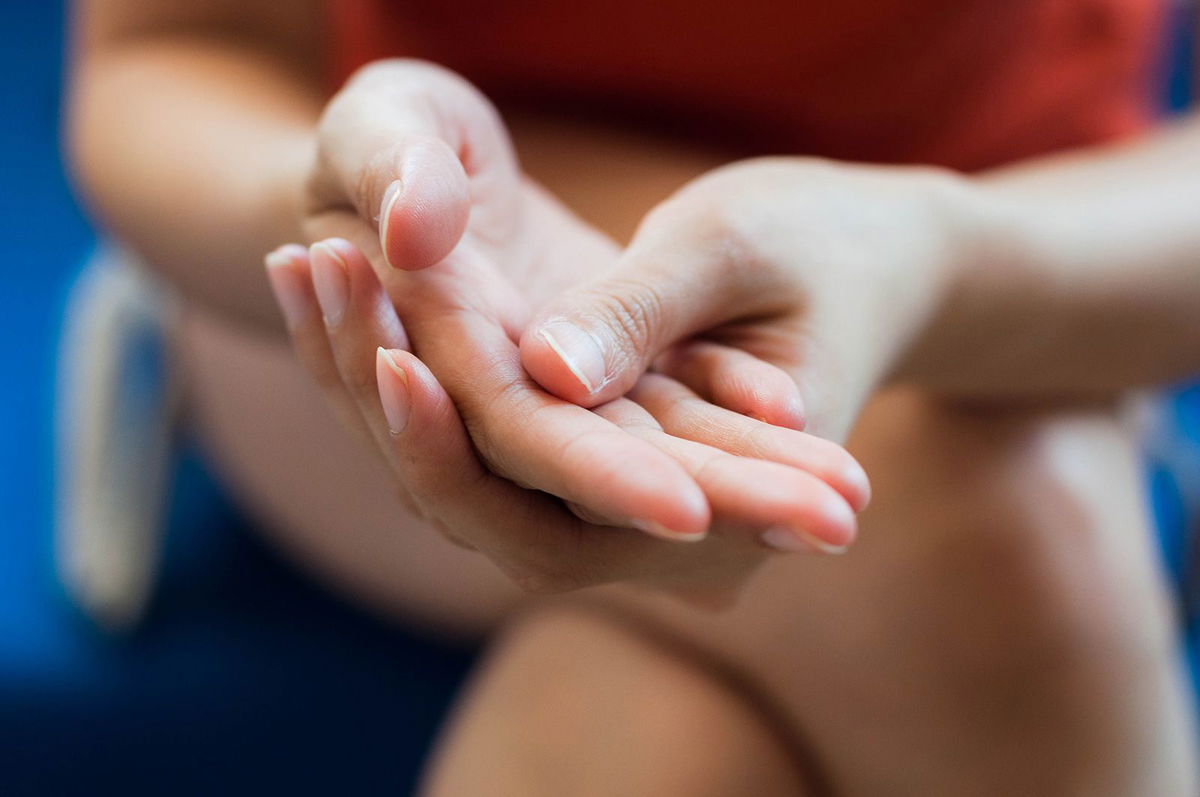A simple technique may help with nail-biting, skin picking and other body-focused repetitive behaviors, new research suggests

By Katie Hunt, CNN
(CNN) — Compulsive nail-biting, skin-picking, hairpulling, and lip- and cheek-biting are among a range of body-focused repetitive behaviors, or BFRBs, that can become a source of distress, but new research may offer hope for relief.
While many people may have one of these habits in a minor form, for a smaller but still significant number of people the behavior can cause visual skin damage — such as bald patches, scars, sores and lesions — and affect their mental health, said Steffen Moritz, head of clinical neuropsychology in the department of psychiatry and psychotherapy at the University Medical Center Hamburg-Eppendorf in Germany.
“Actually most people show one of these habits over their life span, especially nail-biting, to some degree, but all can become problematic when done excessively,” said Moritz, who is a former nail-biter.
“And a lot of these people also have (coexisting) problems, often as a consequence, because they are ashamed of their behavior,” he said. “They avoid intimacy, especially in trichotillomania (pulling out body hair) or in skin-picking, like not taking clothes off in front of their partner for example.”
While often misperceived as minor, these repetitive behaviors in some extreme cases can become life-threatening. Cases of sepsis, a severe reaction to an infection, have been linked to skin-picking. And hairpulling and eating have led to severe stomach problems with fatal complications.
Cognitive behavioral therapy, guided by a therapist, is regarded as the gold standard treatment for problematic BFRBs, Moritz noted, but a small, proof-of-concept trial, the results of which were published in the medical journal JAMA Dermatology on July 19, suggests a gentle self-help technique may have some benefit if a therapist is not an option right away.
Gentle touch
Often shrouded in shame and secrecy, BFRBs should not be regarded as a form of self-mutilation, self-harm or self-hate, Moritz said. They’re more accurately understood as a way to calm and soothe the nervous system, particularly when under stress, to ease boredom or to vent strong emotions such as anger.
BFRBs can be automatic, when watching television or studying, or more intentional — for example when standing in front of a mirror.
“I’ve been a nail-biter myself so I consider myself an expert by profession but also by experience. (BFRBs) do bring some relief, some pleasure, so there are mixed feelings,” he said.
“So the idea was born to do something that is also repetitive and self-soothing, but it’s not dysfunctional. It’s also inconspicuous.”
The habit replacement technique Moritz and his colleagues devised involves softly stroking your skin in a number of different ways: circling the index and middle finger, tapping the middle and index fingers against the thumb, crossing arms and stroking the forearms, circling fingertips on the palm of your other hand, among others. If you’re especially worried about picking skin, you can circle your clothes instead of touching your body directly.
Moritz and his team made a video to demonstrate the different techniques, and it’s up to individuals to work out which technique works best for them.
Moritz said that other forms of habit replacement therapy tend to focus on a “freezing” movement, such as clenching your fist or sitting on your hands when you get the urge to reach for your hair or skin, but he wanted to introduce a benign self-soothing element.
In the study, Moritz recruited 268 people with BFRBs — include participants exhibiting skin-picking, trichotillomania, nail-biting, and lip- and cheek-biting behaviors — who were between ages 18 and 80. Half the group was given a manual describing the technique devised by Moritz and his team, while the others were told they were on a waitlist for the same program.
After six weeks, 54% of people in the group using the habit replacement techniques reported improvement on a scale devised to measure the severity of body-focused repetitive behavior compared with 20% in the control group. Nail-biters seemed to benefit more from the technique.
However, the trial had significant limitations — it was done over a short time period with no further follow-up, the vast majority of people who took part were White women, and participants were recruited via social media.
“We do not know how sustained the effect is,” Moritz said. “We did not do any proper face-to-face assessment,” he added, explaining that many sufferers don’t want to seek help from a medical practitioner.
‘Blanket with thorns’
Stacy Nakell, a psychotherapist and clinical social worker specializing in treating BFRBs, said one of the strengths of the study was that the researchers had acknowledged the function of BFRBs as being about emotional regulation, and she thought the habit replacement technique could be helpful.
“I like that it brings in the idea of self-soothing because I think (that) some of the cognitive behavioral therapies have started with (the idea) that we need to get rid of (BFRBs), and they haven’t really acknowledged the self-soothing component of it,” said Nakell, who is the author of “Treatment for Body-Focused Repetitive Behaviors: An Integrative Psychodynamic Approach.”
“You can think of … (BFRBs) as a blanket with thorns,” she added.
However, she said she thinks habit replacement techniques are just part of a bigger BFRB treatment puzzle.
“We have to stop and check in and get a deeper sense of what emotions are in the mix. It’s still important to address those on a deeper level than just finding a soothing replacement,” Nakell said.
“If you don’t treat the roots, then one of two things happens — either people pick up other problematic behaviors or then feel very disappointed when the short-term effect of more symptom-focused treatment goes away.”
The-CNN-Wire
™ & © 2023 Cable News Network, Inc., a Warner Bros. Discovery Company. All rights reserved.






